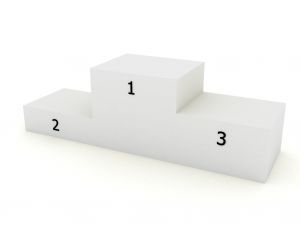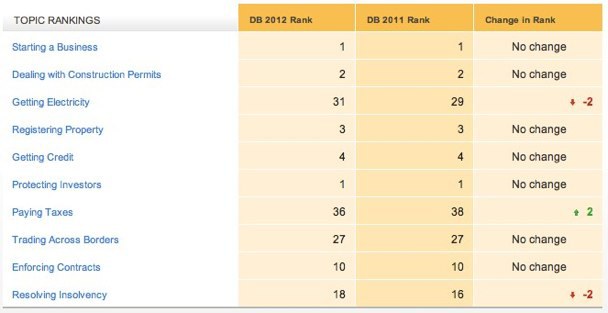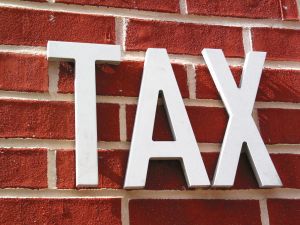Today we have a bit of a comparison of little old New Zealand in a number of measures, from various odds and ends we’ve come across in the past week. So we’ll get to have a look at where we rank globally on a range of topics such as:
- Our currency
- Ease of doing business here
- Tax rates on the rich
The NZ Dollar Versus the Rest
First up is a study by Merk Investments. Axel Merk, Kieran Osborne and Yuan Fang (http://www.merkfunds.com/) have recently published the Merk White Paper – Monetary Policy and it can be found here in its entirety compliments of Lorimer Wilson, editor of www.munKNEE.com (Your Key to Making Money!).
Interestingly New Zealand comes in at number 3 out of the G10 nations covered behind Australia and Canada and just ahead of the USA.
The writers comment that “based on monetary fundamentals within the G10 universe, we find that, as of March 31, 2011, the Australian dollar and the Canadian dollar appear the most compelling two currencies based upon our Merk Monetary Score. Conversely, our methodology ranks the Swiss franc and British pound as the two least attractive currencies within the G10 universe based upon monetary fundamentals.”
Here’s the full list of rankings of the G10 nations:

- Australia
- Canada
- New Zealand
- USA
- Sweden
- Euro area
- Norway
- Japan
- United Kingdom
- Switzerland
The rankings are based upon a number of measures. The authors “analyze various metrics in assessing currencies from a monetary policy perspective. We consider the consumer price index (CPI) and the producer price index (PPI), along with market-based expected inflation measures, to be important indicators in assessing the effectiveness of a central bank’s commitment to the objective of price stability. We also consider the change in the size of a central bank’s balance sheet, as a proxy for the absolute change in money supply. Ultimately, those central banks that are meeting the objective of fostering a price stable environment may lead to more attractive currencies in comparison to those that are not.”
So New zealand comes out looking pretty good which could be a point of view shared by many investors globally given that the kiwi dollar remains so high.
However we still wonder if the “flight to safety” will kick in again at some point. We may continue to see funds heading here while things tick along globally, but given another shock of some kind it’s quite possible funds will head back to the (assumed) safety of the US dollar. So there remains a decent chance of some fast weakening of the kiwi we think – but who knows when exactly.
This is somewhat backed up by the likes of this comment reported on Bloomberg:
“The South Pacific nations’ currencies “tend to be higher beta, so if you see this increase in risk aversion or the deteriorating environment, then it’s going to be hard for them to sustain much of a rally,” said David Grad, a foreign – exchange strategist at Bank of America Corp. in New York. “That’s going to weigh on them going forward.” High-beta currencies tend to have the greatest volatility.”
Gold and silver remain a good hedge against this anyway. They can still go up while the kiwi dollar strengthens versus the US dollar – as they have done over the past 6 years. And they can go up even more when the kiwi undergoes bouts of sharp weakness.
Ease of Doing Business
Another reason for capital finding its way here could be the fact that NZ is still ranked number 3 globally in ease of doing business. According to the “Doing Business” rankings put out by the World Bank, New Zealand has this year again held onto 3rd place from 2011. Coming in only behind Singapore and Hong Kong. Here’s the top 10, again we are just ahead of the USA:
- Singapore
- Hong Kong
- New Zealand
- United States
- Denmark
- Norway
- United Kingdom
- Korea, Rep.
- Iceland
- Ireland
And here’s how we ranked on each of the 10 criteria that are used to determine the ranking:
If you’re a business owner see how much you think you agree with that. But regardless it is another factor attracting capital to NZ.
Tax Rates on the Rich
And you could argue this next measure is also a reason why NZ may be attractive to those with capital (although those in the elite bracket like Russian billionaire Alexander Abramov and fellow richlister filmmaker James Cameron won’t be paying these tax rates as they won’t be salaried earners).
This synopsis has been put together by Lorimer Wilson, editor of www.munKNEE.com (Your Key to Making Money!) from KPMG’s 84-page International Individual Income Tax and Social Security Rate Report to ensure you a fast and easy read.
Tax Rate at USD100,000 Equivalent Income Level
- U.S.A.: 24.3%
- Australia: 25.3%
- New Zealand: 27.4%
- Japan: 28.3%
- Canada: 30.3%
- U.K.: 31.0%
- Spain: 31.7%
- Ireland: 36.0%
- Portugal: 38.5%
- France: 42.0%
- Italy: 42.6%
- Germany: 43.0%
- Greece: 43.5%
- Netherlands: 47.6%
- Belgium: 47.9%
Tax Rate at USD300,000 Equivalent Income Level
- U.S.A.: 29.8%
- New Zealand: 31.1%
- Australia: 37.2%
- Japan: 37.8%
- Spain: 39.2%
- Canada: 40.8%
- U.K.: 41.6%
- Germany: 43.9%
- Greece: 44.5%
- Portugal: 46.3%
- Ireland: 47.0%
- Netherlands: 47.6%
- Italy: 50.0%
- France: 42.0%
- Belgium: 47.9%
Perhaps not altogether surprising to see is that those with higher tax rates are more common in the Euro area. Maybe a connection between more highly socialistic economies and higher government debt perhaps?
Our view is if you have to have an income tax then a flat tax is the way to go. Pity David Lange didn’t let Rogernomics go the whole hog and institute a flat tax back in the 80’s and perhaps NZ would be in a much better position today. A further benefit of a flat tax system is that government can’t afford a multitude of social programs, as this would require an increase in tax across the board to fund the increase in spending. So they can’t “buy the votes” of one section of society to fund increased spending. And if the Euro problems show us anything is that social programs run amok lead to more and more debt which eventually can’t be funded.
This talk of restricting spending also reminds us that when gold is money, this acts as a brake on the government. When the people think the government is overspending they head to the banks and exchange their notes for gold, thereby limiting the government’s ability to spend. Then interest rates have to go up in order to encourage depositors back again. This is the very opposite of what occurs today. Interests rates are continuously cut during a recession – everything is upside down!
Anyway, these few measures show NZ sits in not too bad a position currently in the developed world at least. It will be interesting to see how we fare in the aftermath of another possible downdraft in the world economy though. This remains the $64,000 question!




Pingback: Silver Futures Commitment of Traders Data Looks Bullish | Gold Prices | Gold Investing Guide